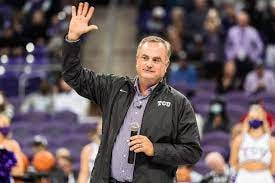TCU proves that the playoff is no closed shop
Horned Frogs came in from the cold to play for a national championship.
The four-team College Football Playoff was a long-promised ice cream cone. The men and women of the intelligentsia demanded it for years and eagerly swallowed the first one. After the sixth and seventh ones, they burped and demanded sprinkles.
Different critics had different reasons. Some of it was Saban-phobia. Some of it was fashionable boredom. It wasn’t the game’s fault. Alabama’s 44-40 gasper over Clemson, and then Tua Tagovailoa’s last-play bomb to Devonta Smith that beat Georgia, were probably two of the best five college games played in the past 25 years.
Most of it was provincialism, an inability to handle the truth about Southeastern Conference superiority. Alabama, Georgia and LSU have all won CFP titles, and Tennessee, Florida and Auburn won them in the Bowl Alliance and BCS formats that replaced the popularity contests of the past. Clemson, which followed the SEC model and featured quarterbacks DeShaun Watson and Trevor Lawrence, became too familiar as well.
People said it was a closed shop, that all conference champs should be included, no matter how counterfeit. That is why the format will expand to 12 teams, year after next, and the urgency will be drained from the regular season, and frightful blowouts will litter the early playoff rounds.
And this is happening just as the nit-picking is being refuted by Purple People with an axe to grind.
Texas Christian was picked to finish seventh in the Big 12. At halftime of its opener at Colorado, which turned out to be perhaps the worst team in Pac-12 history, it trailed, 7-6.
On Monday night TCU will be among the last two standing. Maybe the Horned Frogs won’t stand very long against the defending champs from Georgia, but they started pretty close to the bottom, and they’re here.
If TCU can do this, then the system works fine.
There are reasons to believe TCU will not only beat the 12 1/2-point spread but strongly contend. One is talent. Max Duggan is the type of running threat that can make Georgia’s pass rush stop and think for a second. From Iowa, he turned down Ohio State
Quentin Johnston might be the first receiver to hug Roger Goodell this coming April. Defensive end Dylan Horton had four sacks in the semifinal win over Michigan, and linebacker Dee Winters ran down Michigan receivers and runners all day, with three tackles-for-loss that won him defensive MVP honors. The offensive line is one of only five in the FBS that has been intact for every game, and has a combined 182 carer starts. The Frogs had 21 plays of 50 or more yards, tops in the nation.
Another is moxie. TCU beat six ranked teams this season and won six games by eight or fewer points. The Big 12’s general no-show during bowl season might have cheapened that, but TCU found itself in the fast lane against Michigan, with a 21-3 lead shrinking to 41-38, and Duggan and Johnston delivered a 76-yard touchdown early in the fourth quarter. The Frogs wound up winning, 51-45.
TCU can become the first team to go from a losing record to a national championship of any sort since Michigan State in 1962. Unlike those who usually play on the second week in January, TCU has no natural reason to win. It’s a small private school in Fort Worth that was the pinata for most of the Southwest Conference. From 1965 to 1996, the Horned Frogs never had two consecutive winning seasons, and played in two bowl games in that span.
But what TCU always had was money. Today it has a $2.1 billion endowment. Its donors have already pledged $40 million for a new Human Performance Center, and they have coughed up $400 million for athletics since the Frogs joined the Big 12, ten years ago. Amon Carter Stadium turns 100 this year and never has looked more youthful, thanks to $282 million for two makeovers.
It’s quite a change from the day when basketball coach Buster Brannon went to the authorities and sought a new arena. When asked why, he said, “Well, when we have the tipoff now, I tell our guys to take the wind.”
A campus-wide initiative called Operation Leapfrog, which was intended to help academics first, began the turnaround. Most people associate Dennis Franchione with the decision to leave Alabama for Texas A&M, which seems demented in retrospect, but the NCAA hit Alabama with probation when Franchione got there. He’s remembered differently in Fort Worth, where TCU went to bowl games in each of his first three seasons.
One of them was the Sun Bowl against USC, and Eric Hyman, then the athletic director, was afraid the Frogs had just jumped without parachutes. When they scored first, he said to himself, well, at least 54-7 sounds better than 54-0. Instead they won, 28-19, and Sun Bowl officials apologized for not giving TCU a better opponent.
Gary Patterson followed Franchione and brought TCU into the throne room, with a Rose Bowl win over Wisconsin and eleven seasons of 10 or more wins. He did it by finding the fastest players available, putting them on defense, and figuring out their positions later. TCU eventually built a statue of Patterson, who grew more prickly and intense each year, but then fired the human version during the 2021 season.
By then Sonny Dykes was winning at SMU, and made the 30-mile trip west to coach its old rival. Dykes had a quieter approach and an eye for useful transfers. Since SMU played Navy regularly, he knew about Johnny Hodges, a former lacrosse player. Hodges led TCU in tackles this season.
Dykes worked for the late Mike Leach at Texas Tech and was Jared Goff’s head coach at Cal. His four years in Berkeley brought one bowl game, and he was fired largely because the authorities felt he was looking elsewhere for the next job. That was probably true; the Bears are 10-18 the past three seasons.
Dykes’ father Spike was a high school coaching legend in West Texas, then set the record for wins at Texas Tech, which Leach erased. Spike had a knack for beating Texas and Texas A&M, and his postgame interviews were not to be missed. After a loss to Baylor in which Tech suffered five turnovers, missed two field goals and had another one blocked, he said, “My gosh, that’s enough to choke a mule.”
Spike grew up in the hamlet of Ballinger, Tex., and enjoyed telling the story about the town’s first elevator, servicing the town’s first 2-story building. Who knows, it might have been true.
His dad took Spike to see it. They stood there and watched an old, wrinkled woman board the elevator, then saw the arrow point to the second floor, and return to the first. A young, energetic woman got out.
“Son,” Spike’s dad said, “go get your momma.”
The old-timers at TCU had trouble with the scuffling days because they remembered the 1935 and 1938 national championships, with Dutch Meyer coaching and Sammy Baugh and Heisman winner Davey O’Brien playing quarterback. Meyer was one of the pioneers of passing, using Baugh as an intentional weapon and emphasizing the short pass, now known as the check-down. Baugh led TCU in passing, led TCU’s defense in interceptions and, in the NFL, set a record for average yards per punt that was only broken Saturday night by Tennessee’s Ryan Stonehouse, 82 years later. He was a charter member of the Pro Football Hall of Fame.
When Baugh began playing for Washington, he was told to throw a pass that would hit the receiver in the eye. “Which eye?” Baugh replied.
Monday night’s Horned Frogs will have to be just as precise. But Ohio State found cracks in Georgia’s pass defense and demonstrably outplayed the Bulldogs for at least three quarters. Whether the Frogs have an answer for quarterback Stetson Bennett, whose story is as compelling as theirs, or next-level tight end Brock Bowers, is probably the determining factor.
But expect TCU to at least strike a blow for the 4-team playoff, as football’s brainiacs keep searching for a problem to fit their solution.




I was always an advocate of a 16-team playoff, but the 4-team format has worked so well that I no longer am. No one can argue that college basketball has profited from a 68-team tournament. Regular season games are irrelevant when you have seven or eight teams from a conferene making the tournament. When college football goes to 12, Michigan, Ohio State and others can literally schedule themselves into the 10-2 record that will be required. Nowadays, you have to win big games against top opponents to have a hope of getting in.......And the 4-team playoff does not conflict with the NFL, whereas a 12-team playoff inevitably would at some point. The FCS has no bowl system; the 32 teams that get in the playoffs are the only ones with a postseason. Their tournament has a lot of early blowouts, and the expansion of the tournament has not brought parity. If they feel their tournament works for them, that's fine, but it's too much football.
You insist on writing about "watered down playoffs".........leave the amateurs alone and concentrate on the money-grubbing professionals.
Proof the 4-team CFP doesn't work -- They couldn't find room for #5 Alabama [would rightly only make an 8 team CFP], and were desperately trying to find an excuse to leave TCU out. Then looked correct when they lost to K-State.
Get rid of the conference championship games and partner up with the bowl games. Use automatic bids and a Pairwise [college hockey] approach......and play it like the lower divisions of college football play it.
The powers that be never want change.........for good reason. Lots of excitement [and yes, blowouts....] and lots of money to be made with an expanded playoff.
I used to agree with your view [if I see it correctly]. But the year Alabama got into the 2 team CFP game...despite losing to LSU earlier in the season [at LSU].....I didn't watch it. I knew there was a better way. Nice try with the 4-team CFP. Screw it.......12, than 16, than 24............32??? Invitational 8 team???
With varying budgets and 132 teams......gotta be flexible.